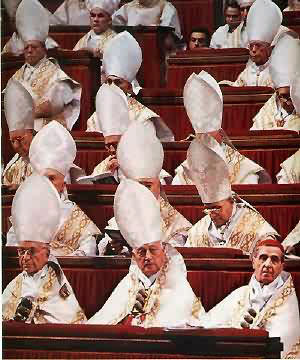 |
Consequences of Vatican II
‘I Always Voted at My Parties' Call’
Lyle J. Arnold, Jr.
Those who commandeered the control of Vatican II had a specific way of thinking. Analyzing the method of this thinking, Atila Guimarães made some comments of immense interest in Volume I of his collection Eli, Eli, Lamma Sabacthani? In studying the texts of the official documents of Vatican II, he found a "fundamental dichotomy of language in which one can perceive, behind the most important concepts, a clash between two currents of thought." The author maintains that this dichotomy was done on purpose, so that the language could be interpreted in either the traditionalist way or following the “doctrines of the neo-modernist current."

The negligent attention of the Bishops reveals their lack of seriousness |
He continues: "Such language appears to be a masterpiece of linguistic wordsmith. Woven like precious Flemish lace, with the inestimable threads of the traditional doctrine's vocabulary, it nevertheless appears to reveal the specter of another mentality. Thus, Progressivism entered the official documents of the Magisterium with its head covered by the laced veil of the old traditional language." (1)
The intrinsic ambiguity of the language made rational analysis useless, because the language could be interpreted as either conservative or progressivist. Hence "any discussion based on the letter of the conciliar documents is doomed." Guimarães resolved this difficulty by studying the spirit of the Council, since such "spirit is synonymous with an unexpressed unity of thinking." Simply said, this unity of thinking is progressivist; therefore, this is the premise on which the letter of the conciliar documents should be understood. Further study found that the base of this spirit is tolerance. (2)
A clue to the strategy of this thinking is revealed in the book Unperceived Ideological Transshipment and Dialogue by Prof. Plinio Corrêa de Oliveira. In it, he introduces his readers to the utility and power of "talismanic" words. (3) These are words that are legitimate and even noble, but when used by the enemies of the Faith, take on elastic properties. That is to say, they stretch to include meanings that place them at the service of the Revolution.
Hence, in Volume II of his Collection, Guimarães proposes that at the beginning of the Council, John XXIII force-fed the talismanic words that would rule the Council in the spirit of tolerance: "In the Council's opening speech, John XXIII describes the new position as one that ‘shows mercy’ for those in error, and that ‘spreads everywhere’ the Church's love for the ‘brotherly unity of all,’ referring in this way to the world and false religions."(4)
This set of talismans promoting mercy and brotherly unity was not lost on the enemies of the Faith lying in wait for the signal to unseat Catholic thinking. From first to last, then, the militant nature of the Church was replaced by a saccharine and anti-Catholic notion of tolerance in tune with progressivist doctrine. A concrete result of such attitude: Paul VI groveling before the Greek Schismatics, "removing the sentence of excommunication," an act that was clearly null. (4) A long train of such groveling followed.
This was the modus operandi of the leaders of the Council. What about the others? The rest of the Council Fathers followed these leaders, like the swarms of lemmings that mindlessly follow the handful of those rodents leading the suicidal race towards the cliffs of the Arctic Sea. (6)
Tribal thinking at Vatican II
In his scholarly work Revolution and Counter-Revolution, Prof. Corrêa de Oliveira describes how the three movements of Protestantism, the French Revolution and Communism coalesced into the Revolution. In a most prescient addendum, we are given a look at the Fourth Revolution which proceeds inexorably from Communism. This revolution results in a kind of tribal collectivism, which eliminates the thinking of individual persons. Individual thought gives way to a "savage thought," a kind of "thought that does not think." (7)

Summarizing his position, Archbishop Dwyer adopted a line from the Admiral's song in the HMS Pinafore |
With this in mind, one can well consider that the tribal revolution was kick-started at Vatican II. In support of this, one Prelate at the Council, Archbishop Robert J. Dwyer, known as a hard conservative, made a remark that epitomizes the non-thinking of Council members. His comments refer to the approval of the Constitution on the Sacred Liturgy, conceived and in great part written under the direction of Archbishop Annibale Bugnini. This document, approved in 1963, ushered in a liturgical revolution in Catholic Tradition.
Speaking about the approval of that document in a later interview, Archbishop Dwyer stated: "It was all good fun." He then made jocular reference to some lines from the comic opera HMS Pinafore. Sir Robert Porter, the apple polisher who becomes Admiral without knowing anything about the sea, sings: "I always voted at my parties' call, and I never thought of thinking for myself at all. I thought so little, they rewarded me, by making me ruler of the Queen's Navee!" (8)
Archbishop Dwyer at least had the honesty to admit that that Constitution was approved with the general lack of seriousness of the conservative Bishops. As in that line from the opera, the Bishops were "rewarded" for their act of accepting Bugnini’s document by keeping their careers.
That many conservative Bishops at the Council took the same position as Archbishop Dwyer shows how little value they gave to the principles of the Catholic Faith they should have defended. From this we see how weak the reaction was to the well-organized progressivist wing that controlled the meetings. Indeed, with a group of heavy-weight members of the Nouvelle Theologie such as Congar, Rahner and De Lubac acting in the study commissions, and sharply trained Prelates such as Cardinals Suenens, Döpfner and Lercaro directing the debates, the Dwyer-like conservatives with their feeble convictions became the easiest possible enemy to defeat.
The similarity between the sellout of the Bishops of 16th-century England who left the Pope to keep their careers under Henry VIII and the sellout of the conservative Fathers of Vatican II who left the Catholic Faith to keep their careers under Paul VI is obvious. Then, however, at least one Prelate, Bishop John Fisher, stood firmly on principle and was martyred for refusing to endorse that general apostasy. At least one person was thinking.
Archbishop Dwyer's confession that many Bishops at the Council approved the document on liturgy "without giving it any thought" can be seen as a symbol of the “conservative” position. It explains in part why everything fell apart and so many errors were accepted without reaction.
May Our Lady of Fatima give us strength to do the opposite of those weak Bishops and, even as simple lay people, improve our apologetics to defend Holy Mother Church against Progressivism as much as we can, until the promised day of the triumph of her Immaculate Heart.
1. Atila S. Guimaraes, In the Murky Waters of Vatican II, Maeta, Metairie, Louisana, 1997, pp. 13, 35-36.
2. Ibid, pp. 37-38.
9 Prof. Plinio Correa de Oliviera, 1970.
4. Atila S. Guimaraes, Animus Injuriandi I (Desire to Offend), TIA: Los Angeles, 2010, pp. 16;
5. Ibid., pp. 136-137.
6. "The Parasite and the Lemmings," 12-21-07, TIA.
7. Plinio Correa de Oliveira, Revolution and Counter-Revolution, The Foundation for Christian Civilization, 1980, p.162.
8. Michael Davies, Pope John's Council, Angelus Press, 2008, pp. 92-93.

Posted November 17, 2010

Related Topics of Interest
 The Nervousness of Progressivism The Nervousness of Progressivism
 Two Levels of Ambiguity Two Levels of Ambiguity
 Deadly Ambiguity Deadly Ambiguity
 Vatican II Revisited Vatican II Revisited
 The Growing Rejection of Vatican II The Growing Rejection of Vatican II
 The Catholic Revolution: New Wine, Old Wineskins The Catholic Revolution: New Wine, Old Wineskins
 Conservatives, Traditionalists & Counter- Revolutionaries Conservatives, Traditionalists & Counter- Revolutionaries
 The Fidelity of the Remnant Throughout History The Fidelity of the Remnant Throughout History

Related Works of Interest
|
|
Vatican II | Hot Topics | Home | Books | CDs | Search | Contact Us | Donate

© 2002-
Tradition in Action, Inc. All Rights Reserved
|
 |
|